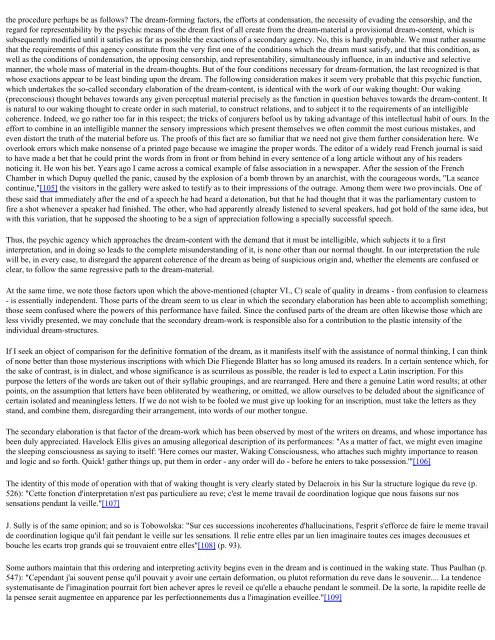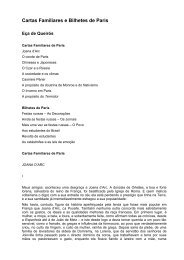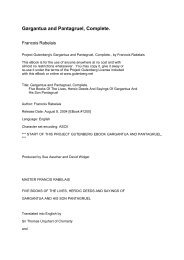The Interpretation of Dreams Sigmund Freud (1900)
The Interpretation of Dreams Sigmund Freud (1900)
The Interpretation of Dreams Sigmund Freud (1900)
Create successful ePaper yourself
Turn your PDF publications into a flip-book with our unique Google optimized e-Paper software.
the procedure perhaps be as follows? <strong>The</strong> dream-forming factors, the efforts at condensation, the necessity <strong>of</strong> evading the censorship, and the<br />
regard for representability by the psychic means <strong>of</strong> the dream first <strong>of</strong> all create from the dream-material a provisional dream-content, which is<br />
subsequently modified until it satisfies as far as possible the exactions <strong>of</strong> a secondary agency. No, this is hardly probable. We must rather assume<br />
that the requirements <strong>of</strong> this agency constitute from the very first one <strong>of</strong> the conditions which the dream must satisfy, and that this condition, as<br />
well as the conditions <strong>of</strong> condensation, the opposing censorship, and representability, simultaneously influence, in an inductive and selective<br />
manner, the whole mass <strong>of</strong> material in the dream-thoughts. But <strong>of</strong> the four conditions necessary for dream-formation, the last recognized is that<br />
whose exactions appear to be least binding upon the dream. <strong>The</strong> following consideration makes it seem very probable that this psychic function,<br />
which undertakes the so-called secondary elaboration <strong>of</strong> the dream-content, is identical with the work <strong>of</strong> our waking thought: Our waking<br />
(preconscious) thought behaves towards any given perceptual material precisely as the function in question behaves towards the dream-content. It<br />
is natural to our waking thought to create order in such material, to construct relations, and to subject it to the requirements <strong>of</strong> an intelligible<br />
coherence. Indeed, we go rather too far in this respect; the tricks <strong>of</strong> conjurers befool us by taking advantage <strong>of</strong> this intellectual habit <strong>of</strong> ours. In the<br />
effort to combine in an intelligible manner the sensory impressions which present themselves we <strong>of</strong>ten commit the most curious mistakes, and<br />
even distort the truth <strong>of</strong> the material before us. <strong>The</strong> pro<strong>of</strong>s <strong>of</strong> this fact are so familiar that we need not give them further consideration here. We<br />
overlook errors which make nonsense <strong>of</strong> a printed page because we imagine the proper words. <strong>The</strong> editor <strong>of</strong> a widely read French journal is said<br />
to have made a bet that he could print the words from in front or from behind in every sentence <strong>of</strong> a long article without any <strong>of</strong> his readers<br />
noticing it. He won his bet. Years ago I came across a comical example <strong>of</strong> false association in a newspaper. After the session <strong>of</strong> the French<br />
Chamber in which Dupuy quelled the panic, caused by the explosion <strong>of</strong> a bomb thrown by an anarchist, with the courageous words, "La seance<br />
continue,"[105] the visitors in the gallery were asked to testify as to their impressions <strong>of</strong> the outrage. Among them were two provincials. One <strong>of</strong><br />
these said that immediately after the end <strong>of</strong> a speech he had heard a detonation, but that he had thought that it was the parliamentary custom to<br />
fire a shot whenever a speaker had finished. <strong>The</strong> other, who had apparently already listened to several speakers, had got hold <strong>of</strong> the same idea, but<br />
with this variation, that he supposed the shooting to be a sign <strong>of</strong> appreciation following a specially successful speech.<br />
Thus, the psychic agency which approaches the dream-content with the demand that it must be intelligible, which subjects it to a first<br />
interpretation, and in doing so leads to the complete misunderstanding <strong>of</strong> it, is none other than our normal thought. In our interpretation the rule<br />
will be, in every case, to disregard the apparent coherence <strong>of</strong> the dream as being <strong>of</strong> suspicious origin and, whether the elements are confused or<br />
clear, to follow the same regressive path to the dream-material.<br />
At the same time, we note those factors upon which the above-mentioned (chapter VI., C) scale <strong>of</strong> quality in dreams - from confusion to clearness<br />
- is essentially independent. Those parts <strong>of</strong> the dream seem to us clear in which the secondary elaboration has been able to accomplish something;<br />
those seem confused where the powers <strong>of</strong> this performance have failed. Since the confused parts <strong>of</strong> the dream are <strong>of</strong>ten likewise those which are<br />
less vividly presented, we may conclude that the secondary dream-work is responsible also for a contribution to the plastic intensity <strong>of</strong> the<br />
individual dream-structures.<br />
If I seek an object <strong>of</strong> comparison for the definitive formation <strong>of</strong> the dream, as it manifests itself with the assistance <strong>of</strong> normal thinking, I can think<br />
<strong>of</strong> none better than those mysterious inscriptions with which Die Fliegende Blatter has so long amused its readers. In a certain sentence which, for<br />
the sake <strong>of</strong> contrast, is in dialect, and whose significance is as scurrilous as possible, the reader is led to expect a Latin inscription. For this<br />
purpose the letters <strong>of</strong> the words are taken out <strong>of</strong> their syllabic groupings, and are rearranged. Here and there a genuine Latin word results; at other<br />
points, on the assumption that letters have been obliterated by weathering, or omitted, we allow ourselves to be deluded about the significance <strong>of</strong><br />
certain isolated and meaningless letters. If we do not wish to be fooled we must give up looking for an inscription, must take the letters as they<br />
stand, and combine them, disregarding their arrangement, into words <strong>of</strong> our mother tongue.<br />
<strong>The</strong> secondary elaboration is that factor <strong>of</strong> the dream-work which has been observed by most <strong>of</strong> the writers on dreams, and whose importance has<br />
been duly appreciated. Havelock Ellis gives an amusing allegorical description <strong>of</strong> its performances: "As a matter <strong>of</strong> fact, we might even imagine<br />
the sleeping consciousness as saying to itself: 'Here comes our master, Waking Consciousness, who attaches such mighty importance to reason<br />
and logic and so forth. Quick! gather things up, put them in order - any order will do - before he enters to take possession.'"[106]<br />
<strong>The</strong> identity <strong>of</strong> this mode <strong>of</strong> operation with that <strong>of</strong> waking thought is very clearly stated by Delacroix in his Sur la structure logique du reve (p.<br />
526): "Cette fonction d'interpretation n'est pas particuliere au reve; c'est le meme travail de coordination logique que nous faisons sur nos<br />
sensations pendant la veille."[107]<br />
J. Sully is <strong>of</strong> the same opinion; and so is Tobowolska: "Sur ces successions incoherentes d'hallucinations, l'esprit s'efforce de faire le meme travail<br />
de coordination logique qu'il fait pendant le veille sur les sensations. Il relie entre elles par un lien imaginaire toutes ces images decousues et<br />
bouche les ecarts trop grands qui se trouvaient entre elles"[108] (p. 93).<br />
Some authors maintain that this ordering and interpreting activity begins even in the dream and is continued in the waking state. Thus Paulhan (p.<br />
547): "Cependant j'ai souvent pense qu'il pouvait y avoir une certain deformation, ou plutot reformation du reve dans le souvenir.... La tendence<br />
systematisante de l'imagination pourrait fort bien achever apres le reveil ce qu'elle a ebauche pendant le sommeil. De la sorte, la rapidite reelle de<br />
la pensee serait augmentee en apparence par les perfectionnements dus a l'imagination eveillee."[109]









